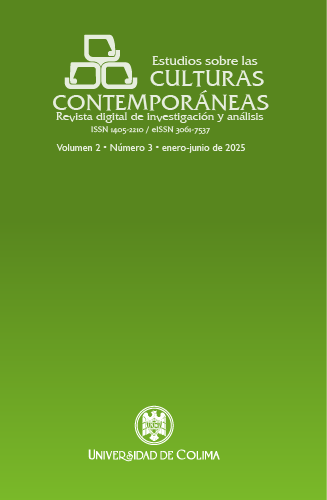Relationships between the psychological meaning of well-being and family in adolescents from Colima, Mexico
DOI:
https://doi.org/10.53897/RevESCC.2025.3.01Keywords:
Psychological meaning, Wellbeing, Family, Adolescence, Natural Semantic NetworksAbstract
The concept of well-being has become increasingly relevant in society. However, its widespread recognition does not imply that it is understood uniformly by everyone, as it is a construct with diverse meanings. Well-being is characterized by its complex and multifaceted nature, incorporating both objective and subjective components. Moreover, to research well-being, it is important to consider the life cycle stage and culture of the individuals involved, making it crucial to conduct studies focused on a specific age group and context, in this case, adolescents from Colima, Mexico, for whom their families are fundamental, allowing their full development. Therefore, a study was conducted with the aim of analyzing the relationships between the psychological meaning of well-being and family from the perspective of adolescents from Colima. The natural semantic networks technique was used to study a sample of 62 high school students from the city of Colima, Mexico. The results show a close relationship between the meanings of well-being and family, revealing various dimensions in common, but also contrasts. It was concluded that families are an essential source of well-being for the participating adolescents.
Downloads
Metrics
References
Aguilar, C. A. (2024). Los significados de la sustentabilidad. Estudios sobre las Culturas Contemporáneas, 1(1), 57-89. https://doi.org/10.53897/RevESCC.2024.1.03 DOI: https://doi.org/10.53897/RevESCC.2024.1.03
Amato, P. R. (2005). The impact of family formation change on the cognitive, social, and emotional well-being of the next generation. The Future of Children, 15(2), 75-96. https://doi.org/10.1353/foc.2005.0012 DOI: https://doi.org/10.1353/foc.2005.0012
Amato, P. R. (2010). Research on divorce: Continuing trends and new developments. Journal of Marriage and Family, 72(3), 650-666. https://doi.org/10.1111/j.1741-3737.2010.00723.x DOI: https://doi.org/10.1111/j.1741-3737.2010.00723.x
Andrews, F. M. y Withey, S. B. (1976). Social indicators of well-being: American’s perceptions of life quality. Springer. https://doi.org/10.1007/978-1-4684-2253-5 DOI: https://doi.org/10.1007/978-1-4684-2253-5
Bianchi, S. M. y Milkie, M. A. (2010). Work and family research in the first decade of the 21st century. Journal of Marriage and Family, 72(3), 705-725. https://doi.org/10.1111/j.1741-3737.2010.00726.x DOI: https://doi.org/10.1111/j.1741-3737.2010.00726.x
Brock, D. (1993). Quality of life in health care and medical ethics. En M. Nussbuam y A. Sen (Eds.), The quality of life (pp. 95-132). Clarendon Press. https://doi.org/10.1093/0198287976.003.0009 DOI: https://doi.org/10.1093/0198287976.003.0009
Carpenter, S. R., Mooney, H. A., Agard, J., Capistrano, D., DeFries, R. S., Díaz, S. y Whyte, A. (2009). Science for managing ecosystem services: Beyond the Millennium Ecosystem Assessment. Proceedings of the National Academy of Sciences, 106(5), 1305-1312. https://doi.org/10.1073/pnas.0808772106 DOI: https://doi.org/10.1073/pnas.0808772106
Collins, W. A. y Laursen, B. (2004). Parent-adolescent relationships and influences. En R. M. Lerner y L. Steinberg (Eds.), Handbook of Adolescent Psychology (pp. 331-361). John Wiley & Sons. https://doi.org/10.1002/9780471726746.ch11 DOI: https://doi.org/10.1002/9780471726746.ch11
De los Santos X. y Gutiérrez, J. R. (2017). Medición del bienestar psicológico en adolescentes de educación media superior del Estado de México. Revista de Psicología de la Universidad Autónoma del Estado de México, 6(11), 61-79. https://hemeroteca.uaemex.mx/index.php/rpsicologia/article/view/13351
Diener, E. (1984). Subjective well-being. Psychological Bulletin, 95(3), 542-575. https://psycnet.apa.org/doi/10.1037/0033-2909.95.3.542 DOI: https://doi.org/10.1037//0033-2909.95.3.542
Diener, E., Emmons, R. A., Larsen, R. J. y Griffin, S. (1985). The Satisfaction With Life Scale. Journal of Personality Assessment, 49(1), 71-75. https://doi.org/10.1207/s15327752jpa4901_13 DOI: https://doi.org/10.1207/s15327752jpa4901_13
Diener, E., Oishi, S. y Lucas, R. E. (2003). Personality, culture, and subjective well-being: Emotional and cognitive evaluations of life. Annual review of psychology, 54(1), 403-425. https://doi.org/10.1146/annurev.psych.54.101601.145056 DOI: https://doi.org/10.1146/annurev.psych.54.101601.145056
Diener, E. y Suh, E. M. (1996). Measuring quality of life: Economic, social and subjective indicators. Social Indicators Research, 40(1), 189-216. https://link.springer.com/article/10.1023/a:1006859511756 DOI: https://doi.org/10.1023/A:1006859511756
Dłużewska, A. (2016). Wellbeing–conceptual background and research practices. DOI: https://doi.org/10.5559/di.25.4.06
Društvena istraživanja: časopis za opća društvena pitanja, 25(4), 547-567. https://doi.org/10.5559/di.25.4.06 DOI: https://doi.org/10.5559/di.25.4.06
García, C. A., Pérez, S. L., Rodríguez, E. I. y Márquez, C. V. (2023). Las redes semánticas actitudinales. Una propuesta de evaluación de actitudes con redes semánticas naturales. En S. L. Pérez, I. U. Jiménez, y E. J. Medina (Eds.), Redes semánticas. Nuevas perspectivas y aplicaciones en psicología (pp. 43-59). Universidad de Colima. https://doi.org/10.53897/LI.2023.0004.UCOL DOI: https://doi.org/10.53897/LI.2023.0004.UCOL
García, C. A. y Tello, O. A. (2022). Significados psicológicos y actitudes en relación con la inclusión que presentan las y los miembros de los Servicios de Asistencia Técnica Escolar de Educación Especial. En B. Lara, C. I. Huerta, y S. Gutiérrez (Eds.), Estudios y reflexiones sobre inclusión, diversidad y vulnerabilidad (pp. 71-98). Universidad de Guadalajara.
Gross, J. J. y John, O. P. (2003). Individual differences in two emotion regulation processes: Implications for affect, relationships, and well-being. Journal of Personality and Social Psychology, 85(2), 348-362. https://doi.org/10.1037/0022-3514.85.2.348 DOI: https://doi.org/10.1037/0022-3514.85.2.348
Grusec, J. E. (2011). Socialization processes in the family: Social and emotional development. Annual Review of Psychology, 62, 243-269. https://doi.org/10.1146/annurev.psych.121208.131650 DOI: https://doi.org/10.1146/annurev.psych.121208.131650
Hair, E. C., Moore, K. A., Garrett, S. B., Ling, T. y Cleveland, K. (2008). The continued importance of quality parent-adolescent relationships during late adolescence. Journal of Research on Adolescence, 18(1), 187-200. https://doi.org/10.1111/j.15327795.2008.00556.x DOI: https://doi.org/10.1111/j.1532-7795.2008.00556.x
Helsen, M., Vollebergh, W. y Meeus, W. (2000). Social support from parents and friends and emotional problems in adolescence. Journal of Youth and Adolescence, 29(3), 319-335. https://doi.org/10.1023/A:1005147708827 DOI: https://doi.org/10.1023/A:1005147708827
Hill, N. E. y Tyson, D. F. (2009). Parental involvement in middle school: A meta- analytic assessment of the strategies that promote achievement. Developmental Psychology, 45(3), 740-763. https://doi.org/10.1037/a0015362 DOI: https://doi.org/10.1037/a0015362
Huebner, E. S. (2004). Research on assessment of life satisfaction of children and adolescents. Social Indicators Research, 66(1-2), 3-33. https://doi.org/10.1007/978-1-4020-2312-5_2 DOI: https://doi.org/10.1023/B:SOCI.0000007497.57754.e3
Larson, R., Moneta, G., Richards, M. H. y Wilson, S. (2002). Continuity, stability, and change in daily emotional experience across adolescence. Child Development, 73(4), 1151-1165. https://doi.org/10.1111/1467-8624.00464 DOI: https://doi.org/10.1111/1467-8624.00464
Luna, A. C. A., Laca, F. A. y Mejía, J. C. (2011). Bienestar Subjetivo y Satisfacción con la Vida de Familia en Adolescentes Mexicanos de Bachillerato. Psicología Iberoamericana, 19(2), 17-26. https://doi.org/10.48102/pi.v19i2.225 DOI: https://doi.org/10.48102/pi.v19i2.225
Manfredi, M. y Di Pasquale, E. A. (2021). Medición del bienestar objetivo y subjetivo: una propuesta de índice de desarrollo humano integral. Revista de economía mundial, (57), 161-186. https://doi.org/10.33776/rem.v0i57.4648 DOI: https://doi.org/10.33776/rem.v0i57.4648
Martínez, I. (2018). Los niveles de felicidad a lo largo de la vida en México. En R. Millán y R. Castellanos (Eds.), Bienestar subjetivo en México (pp. 219-252). Universidad Nacional Autónoma de México. https://ru.iis.sociales.unam.mx/bitstream/IIS/5445/7/bienestar_subjetivo.pdf
Mayordomo, T., Sales, A., Satorres, E. y Meléndez, J. C. (2016). Bienestar psicológico en función de la etapa de vida, el sexo y su interacción. Pensamiento psicológico, 14(2), 101-112. https://doi.org/10.12804/apl33.01.2015.03 DOI: https://doi.org/10.11144/Javerianacali.PPSI14-2.bpfe
Merriam-Webster. (s.f.). Well-being. En Merriam-Webster.com dictionary. Recuperado el 12 de marzo de 2024, de https://www.merriam-webster.com/dictionary/well-
Millenium Ecosystem Assessment (2005). Ecosystems and human wellbeing: synthesis/ current state and trends/ scenarios/ policy responses/ multiscale assessments. Island Press. https://www.wri.org/research/millennium-ecosystem-assessment-ecosystems-and-human-well-being
Pérez, S. L., García, C. A., Rodríguez, E. I., González, J. R. y López, A. L. (2020). Comparación del significado psicológico de estrés y aprendizaje entre universitarios de México y Costa Rica. Dissertare Revista de Investigación en Ciencias Sociales, 5(2), 1-17. https://revistas.uclave.org/index.php/dissertare/article/view/2891
Proctor, C. L., Linley, P. A., y Maltby, J. (2009). Youth life satisfaction: A review of the literature. Journal of happiness studies, 10, 583-630. https://doi.org/10.1007/s10902-008-9110-9 DOI: https://doi.org/10.1007/s10902-008-9110-9
Real Academia Española. (s.f.). Bienestar. En Diccionario de la lengua española. Recuperado el 12 de marzo de 2024, de: https://dle.rae.es/bienestar
Rohner, R. P. y Khaleque, A. (2005). Parental acceptance-rejection and parental control: A meta-analytic review of cross-cultural and intracultural studies. Parenting: Science and Practice, 5(3), 251-273. https://doi.org/10.1207/s15327922par0503_3 DOI: https://doi.org/10.1207/s15327922par0503_3
Rosenberg, M. (1965). Society and the adolescent self-image. Princeton University Press. https://doi.org/10.1515/9781400876136 DOI: https://doi.org/10.1515/9781400876136
Ryff, C. D. (1989). Happiness is everything, or is it? Explorations on the meaning of psychological well-being. Journal of personality and social psychology, 57(6), 1069-1081. https://psycnet.apa.org/doi/10.1037/0022-3514.57.6.1069 DOI: https://doi.org/10.1037//0022-3514.57.6.1069
Ryff, C. D. (2014). Psychological well-being revisited: Advances in the science and practice of eudaimonia. Psychotherapy and Psychosomatics, 83(1), 10-28. https://doi.org/10.1159/000353263 DOI: https://doi.org/10.1159/000353263
Ryff, C. D. y Keyes, C. L. M. (1995). The structure of psychological well-being revisited. Journal of personality and social psychology, 69(4), 719-727. https://psycnet.apa.org/doi/10.1037/0022-3514.69.4.719 DOI: https://doi.org/10.1037//0022-3514.69.4.719
Ryff, C. D. y Singer, B. H. (2008). Know thyself and become what you are: A eudaimonic approach to psychological well-being. Journal of happiness studies, 9, 13-39. https://doi.org/10.1007/s10902-006-9019-0 DOI: https://doi.org/10.1007/s10902-006-9019-0
Seligman, M. E. y Csikszentmihalyi, M. (2000). Positive psychology: An introduction. American Psychologist, 55(1), 5-14. https://doi.org/10.1037/0003-066X.55.1.5 DOI: https://doi.org/10.1037//0003-066X.55.1.5
Sociedad Mexicana de Psicología. (2010). Código ético del psicólogo. Trillas.
Steinberg, L. y Morris, A. S. (2001). Adolescent development. Annual Review of Psychology, 52, 83-110. https://doi.org/10.1146/annurev.psych.52.1.83 DOI: https://doi.org/10.1146/annurev.psych.52.1.83
Valdez, J. L. (1998). Las redes semánticas naturales. Usos y aplicaciones en psicología social. Universidad Autónoma del Estado de México.
Published
How to Cite
Issue
Section
Categories
License
Copyright (c) 2025 Sara Lidia Pérez Ruvalcaba, César Augusto García Avitia, Claudia Verónica Márquez González

This work is licensed under a Creative Commons Attribution-NonCommercial-ShareAlike 4.0 International License.
Estudios sobre las Culturas Contemporáneas permite distribuir, remezclar, adaptar y crear a partir del material en cualquier medio o formato, únicamente con fines no comerciales y siempre que se le dé crédito al creador. Si remezcla, adapta o crea a partir del material, debe licenciar el material modificado bajo términos idénticos. CC BY-NC-SA, incluyendo los siguientes elementos:
BY: se debe dar crédito al creador.
NC: Solo se permiten usos no comerciales de la obra.
SA: Las adaptaciones deben compartirse bajo los mismos términos.
Funding data
-
Universidad de Colima
Grant numbers Programa de Fortalecimiento de la Investigación – Convocatoria 2023










